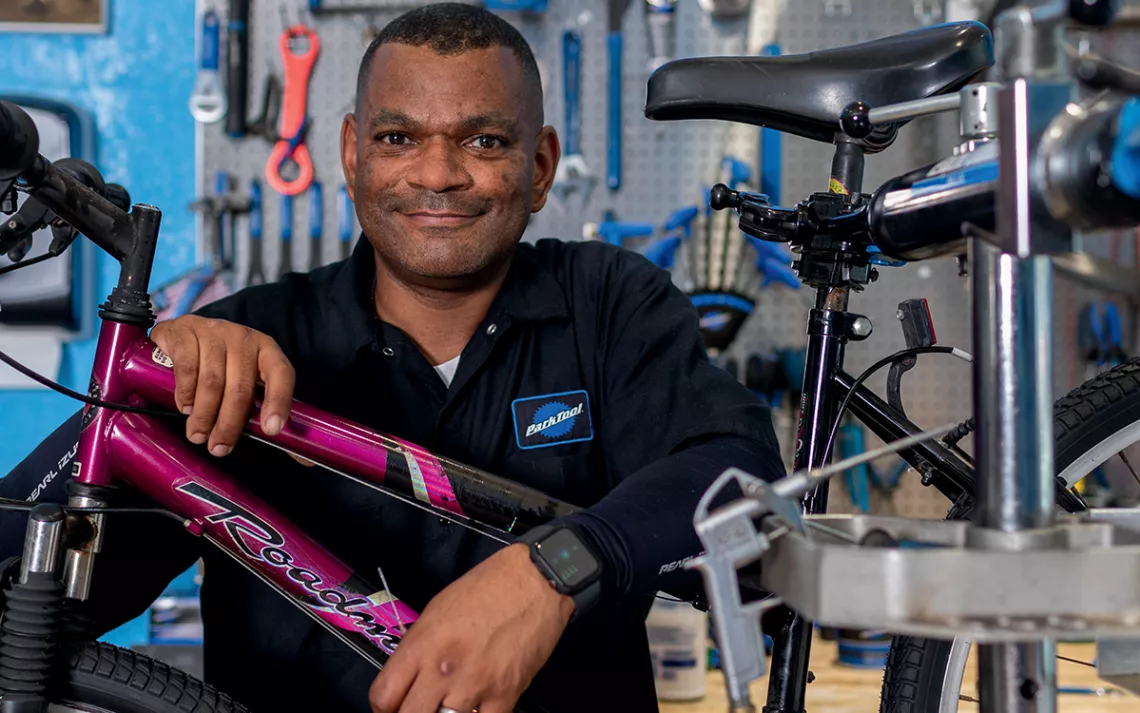In L.A., a Bike Shop Owner Sees a Boom in the Pandemic
George Turner Jr. of Penuel Bicycles talks about his surprise success

George Turner Jr., owner of Penuel Bicycles | Photo by Tara Pixley
When I was growing up here in Inglewood, California, I was able to work out my frustrations by heading out on my bike and riding for as long as I could. As long as I got home before sundown, it was no problem, and it kept me out of trouble. When I opened Penuel Bicycles 14 years ago, my dream was to share with my community all that cycling has done for me.
The funny part is that my community didn't want it. I'd noticed that when I went out on a ride, I was always one of the only Black people, but I hadn't put two and two together and understood that my neighborhood was probably not the best place to have a bike shop.
I was getting old—I'm 47. I held on to the dream that if I could save one person through cycling, it would all be worth it. But at some point you also need money.
Then came COVID-19. At the beginning of the lockdown, our landlord gave us a three-day notice. We were gonna lose our lease and close. "OK, this is gonna be all bad," I thought. "People can't go out. It's the end."
But on the third day, a guy came in who wanted a bike. He picked out a Pivot Firebird 29" Team XTR, the most expensive bike we had in the store—$8,900. And he said, "Do you mind if I pay cash? I don't want my wife to find out about it." I had to go to the bank first and see if they would even take it. He bought the bike. And we made the rent.
A couple of weeks into the pandemic, people started coming in and buying bikes. I attribute that to there being so few things you could do as a family except go out and ride bikes. So the parents went out and bought their kids bikes. And then they bought themselves bikes. The folks who used to go outside the neighborhood to spend money didn't want to leave the neighborhood because of COVID, so they spent their money here. We started doing five times the business that we did before quarantine.
After about four weeks, we ran out of bikes. It wasn't just us—the whole country ran out of bikes: Trek, Giant, Specialized, KHS, Fuji. Which meant that people started pulling bikes out from under the house, from the garage, from the side of the house, wherever, and they wanted them fixed. Bikes that had been backed into with the car, stepped on, had stuff thrown on top of them. I had to wear sleeves because these bikes had so many critters on them that I was getting bit by bugs all up and down my arms.
We were doing about 30 bikes a day until all the suppliers ran out of parts. For a while, we couldn't even fix a flat, because we didn't have any inner tubes, and we couldn't replace tires because there were no tires. We were turning down more bikes than we were able to take in. I've been working in the bike business since 1996, and I've never seen anything like it.
An additional thing that happened was that during the Black Lives Matter protests we started getting people who would not normally come down here. A lot of these people don't have normal dealings with Black people, so there were some differences in communication. I had a customer call and say, "Hey, I have two bikes in boxes that I want you to put together. Can you guys come up to my house in Beverly Hills?" I referred him to a mobile bike repair. He said, "Can I be blunt with you? I'm just trying to support a shop in the hood."
Another customer came in and dropped off a Black Lives Matter T-shirt, brand-new in its plastic bag, with a note on it saying "George, hope all is well," with a little heart drawn on it. She was trying to say the same thing, but it was awkward.
The name of my shop, Penuel, comes from the place where Jacob wrestled with the angel and said, "For I have looked into the face of God and survived." At a time when I was extremely discouraged, I had opened the Bible to that story. I saw myself fitting into it, like I was the one wrestling with God.
Maybe six or seven months ago, when I was at church, my pastor told me, "God is going to bless your business in ways that you would never have imagined." He was right. Because nobody could have told me then that one day a global pandemic would change my life for the better.
This article appeared in the November/December 2020 edition with the headline "Wrestling With Angels."
 The Magazine of The Sierra Club
The Magazine of The Sierra Club



